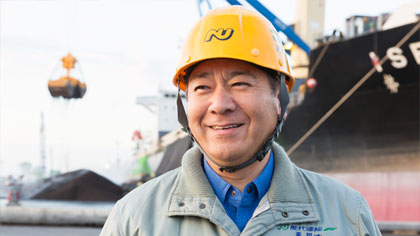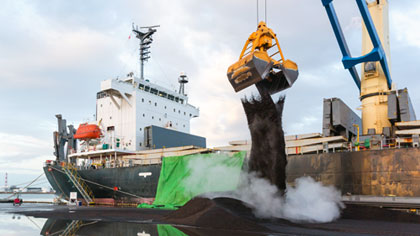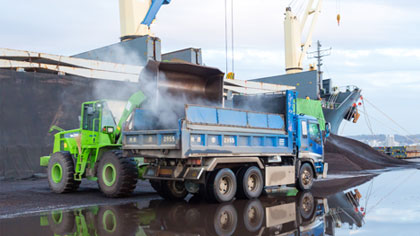-


How is Noshiro Unyu connected to biomass power generation?
Noshiro Unyu was founded in 1950 and has since been operating a forwarding business mainly in Noshiro. Following the opening of Noshiro Port in 1974, it launched a port transport business in April 1975. As the volume of cargo handled in the port transport services increased, it expanded its services into areas such as a ship agency business and a customs clearance business.
We have recently built ties with the biomass power generation project of United Renewable Energy Co., Ltd. That derived from a possible project involving the land transport of woodchips made from unused materials in the prefecture to the biomass power plant at Mukaihama as fuel for power generation.
There was another possible project of importing overseas palm kernel shells (PKS) as auxiliary fuel to ensure stable biomass power generation. Consequently, it was determined that we would undertake to provide port transport services of unloading PKS at Akita Port and deliver them to the biomass power plant.
-


You are in charge of conveying PKS. Has it brought about any change?
We opened the Akita Office in August 2001 and obtained a license for the general port transport business at Akita Port in September 2007. Until then, we had dealt chiefly with marine cargo weighing less than 2,000 tons each at Akita Port, while PKS cargo has an approximate weight of 10,000 tons. We started handling heavy cargo that we had never dealt with before. The high marks given to our track record helped us receive inquiries for new business.
-


Do you find any challenges in handing PKS?
The weight of PKS per import is around 10,000 tons. It is necessary to unload 10,000 tons of PKS in about three days and to transport it to the premises of the biomass power plant at Mukaihama. That volume is large, but in fact a single piece of PKS is small and lightweight. If there is any strong wind during the period between unloading at the port and reloading onto a truck, it will blow the PKS away. For this reason, PKS cannot be left on the ground after it is unloaded. We always take care to carry it away from the port safely, efficiently and quickly. We always check the weather before and after the unloading to determine the unloading schedule.
-
What is your feeling about your connection with biomass power generation?
We had never handled PKS before and the volume handled at the Akita Port is much larger than that of freight we had dealt with before. It is a major challenge to us and it is a fulfilling job.
The construction of a biomass power plant at Mukaihama gave us the opportunity to unload PKS for the first time at the Akita Port. PKS has newly be added to the items imported through Akita Port, and nearly 50,000 tons, equivalent to the estimated annual consumption, will be constantly unloaded at the port. I think that our service will also win recognition for helping to expand the use of the port.
* Affiliates and titles etc. of the interviewees are current as of the time of the interview or publication.


